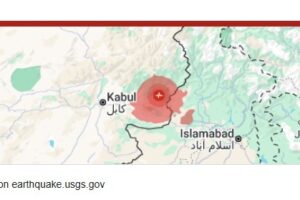The United States has historically served as a refuge for those fleeing persecution, conflict, and danger in their home countries. In recent years, Afghan refugees have sought safety within U.S. borders, particularly after the withdrawal of U.S. troops from Afghanistan in 2021, which triggered widespread turmoil. For many Afghans, the journey to America was perilous, with some entering through unconventional routes, including via the southern border.
While many Afghan refugees were admitted through organized evacuation programs such as Operation Allies Welcome, which focused on those who assisted U.S. forces, others have faced scrutiny due to their immigration status or personal histories. A number of these individuals have sought asylum or received Temporary Protected Status (TPS), a designation that allows individuals from countries experiencing ongoing armed conflict, environmental disasters, or other extraordinary circumstances to reside in the United States temporarily.
The political landscape in the U.S. is dynamic, and shifts in administration priorities can significantly impact immigration policies. Afghan refugees now face uncertainty, particularly amid discussions about the potential rollback of TPS or other protections for those who arrived irregularly.
Many Afghan refugees have faced extreme circumstances, including threats from the Taliban, lack of economic opportunities, and social instability in their homeland. While a significant portion of evacuees entered the U.S. directly through formal programs, others made their way through third countries such as Mexico, seeking asylum at the southern border.
This has led to challenges for U.S. immigration officials, who must balance humanitarian obligations with national security concerns. Reports suggest that some Afghan individuals have faced accusations of past criminal activity or association with groups of concern, complicating their cases for asylum or residency. It is important, to differentiate between unverified claims and substantiated legal records.
TIPS has been a lifeline for many Afghans, offering them a legal pathway to live and work in the United States temporarily. The program provides a reprieve for individuals from countries deemed unsafe for return due to armed conflict or other dire conditions. Afghanistan was designated for TPS in 2022, reflecting the U.S. government’s acknowledgment of the ongoing crisis in the country.
For Afghan refugees who entered the U.S. through non-traditional routes, TPS has offered a measure of stability, with debates about the future of TPS under different political administrations, these protections could be at risk.
President Donald Trump has been vocal about his tough stance on immigration. During his presidency, he sought to terminate TPS designations for multiple countries, arguing that the program was being extended beyond its intended purpose. While courts ultimately blocked many of these efforts, a potential second term for Trump has reignited fears among Afghan refugees and advocacy groups that similar policies could resurface.
For Afghans who entered the U.S. via the southern border, the fear of deportation is particularly acute. Many are concerned that their asylum claims could be denied or that their TPS status could be revoked, forcing them to return to a country still grappling with severe instability and Taliban control.
Refugee and immigrant advocacy organizations have been vocal in their efforts to ensure protections for Afghan refugees. They argue that deporting individuals to Afghanistan would place them at significant risk of harm, violating international humanitarian principles. Legal experts also emphasize that each case should be evaluated individually, ensuring due process and fair consideration of circumstances.
The fate of Afghan refugees in the United States will likely depend on a combination of political, legal, and humanitarian factors. Policymakers face the challenge of balancing security concerns with the moral and legal obligation to protect vulnerable populations.
For Afghan refugees, the road ahead remains uncertain. Advocacy, community support, and ongoing dialogue will be essential to ensure that their voices are heard and their rights are protected.





